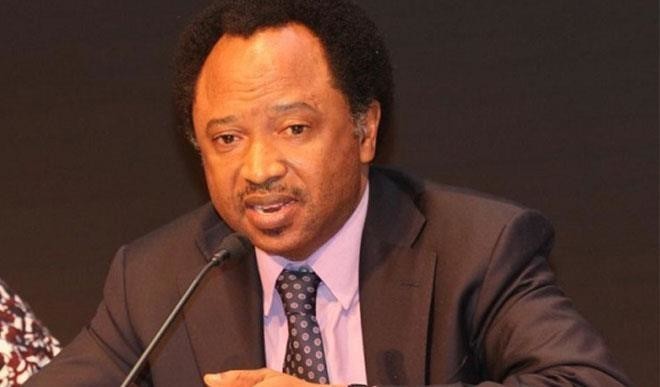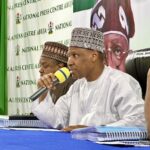Senator Shehu Sani was reported at the weekend to have said, “Indirect primary is a maternity room for corruption. So, I stand with direct primaries.” He is probably right in his assessment of indirect party primaries. The problem is that direct primaries could be the abattoir for corruption. It is not really a matter of which one is better. In Nigeria, it is more a case of which one is worse.
Leaders of the ruling All Progressives Congress [APC] are presently embroiled in a dispute over the interpretation of last Thursday’s National Executive Committee [NEC] decision as to which mode of primaries it should adopt to choose its candidates for various elective offices in the 2019 elections. It has until early October to do so, according to the deadline set by INEC. Governors Simon Lalong and Yahaya Bello, who spoke after the NEC meeting, said the presidential primaries would be direct, i.e. involving all party members, whereas other primaries would be indirect subject to agreement by each state’s party executive committee after consulting all critical stakeholders, i.e. aspirants.
The following day however, APC’s acting national publicity secretary issued a statement saying that interpretation was wrong. The correct position, he said, is that all primaries would be direct but a state chapter could seek permission of the National Working Committee [NWC] to hold indirect primaries if majority of its state executive committee members and critical stakeholders so agree. From the tone of the statement, it was clear that NWC wants all state chapters to hold direct primaries for all posts and it could well reject a request by a state chapter to conduct indirect primaries. APC’s national secretary Mai Mala Buni however contradicted this interpretation. He said in effect that state chapters are free to choose the mode of election they want given their peculiarities and they would so inform the NWC.
Each side in the direct versus indirect primaries dispute found plausible reasons to buttress its position. APC national chairman Adams Oshiomhole said direct primaries are more democratic and give all party members a sense of belonging, which is very plausible. However, the reasons advanced only mask the interest of various powerful party leaders. President Muhammadu Buhari, for example, is said to favour direct primaries for the presidency but is apparently willing to allow indirect primaries for other offices. That does not suggest high principle. Buhari probably prefers direct primaries because he is much more popular with the grassroots than he is with elite convention delegates. At least in the North, ordinary APC members would be expected to go to the polling centres with little mobilization, stand in the sun and rain and vote for Buhari with no direct personal benefit to themselves. The same cannot be said of convention delegates.
As for the 24 APC governors, most of them have indicated a preference for indirect primaries. The reasons they advanced, according to a governor anonymously quoted by Daily Trust on Sunday, sounded reasonable. For one there is the cost. APC’s NWC may dictate the mode of primaries but in every APC-controlled state it is the governor who must find the money to organize it, and the cost could be huge. They also cited insecurity; the security situation in many states is such that collecting people at every polling unit is a real-time danger.
Thirdly, the governors cited the possibility of infiltration by PDP elements. I can personally attest to this possibility. In 1991 when Kaduna State SDP governorship primaries were scheduled for a run-off between Prof Ango Abdullahi and Mr. Adamu Maikori, I arrived at my friend’s house and found a meeting of NRC Youth Wing leaders in progress. As I listened in, they decided that Ango was the stronger SDP candidate and they would therefore direct their supporters all over the state to turn up at the polling centres on run-off day and help to defeat Ango. The SDP primaries were direct and by open ballot. NRC could not have easily infiltrated it if it were a delegates’ convention.
APC governors also cited the party’s lack of preparedness to conduct direct primaries due to the absence of a good register of party members. Nor does APC have PVCs and card readers to enhance credibility of the polls, which would be almost like a general election. The governors cited one more reason, that the rancour that could ensue from direct primaries would be difficult to manage and would prevent the party uniting before the main election. I personally do not think that division is more likely to result from a direct primary than an indirect one. The well-known aversion of Nigerian politicians to accept defeat will ensure post-primaries rancour no matter the method of election used.
Despite the listed challenges, APC governors were ready to tolerate direct presidential primaries for two key reasons: one because the president indicated he wants it, and secondly because Buhari is the only candidate standing in the primaries. The biggest danger is that an important person may also pick up the APC form before the close of nomination, something that PDP can arrange. If that happens, the party may be forced to reconsider holding direct presidential primaries because it cannot really organize a fair, competitive contest.
Now, plausible though the governors’ reasons are, they are not their real reason. Congress and convention delegates chosen during the ward, local government and state congresses held earlier this year are mostly loyal to the governors. They have invested heavily in them, politically and financially, and they are expected to do their bidding unquestioningly. In most states, no one can win a party primary election for any post at all unless the governor endorses him. It was like that in PDP; so is it in APC.
It is for this reason that APC legislators, many of whom are not on good terms with their governors, are clamouring for direct primaries. They believe it would give them a fighting chance by appealing directly to ordinary party members, instead of congress delegates. I personally doubt if the outcome will be different. The same party bosses that control convention delegates also have the reach to control voters in direct primaries. President Buhari is averse to indirect primaries because convention delegates use them to make a kill and they return home with bags of money. In direct primaries, smaller amounts of money are used to entice voters but because there are many more people involved, the cost pretty much amounts to the same thing.
Sometime in 1992, as a young reporter of Citizen magazine, I interviewed the NRC chairman of Akure Local Government, Ondo State and he lamented the conduct of voters in the NRC presidential primaries of that year, which were direct. He said, “A man will tell you to give him money before he will go and vote. He will say, ‘How can I use my money to join vehicle just because I want to vote for somebody?” That culture does not change very quickly. In 2007 I attended a three-hour lunch with then President Umaru Yar’adua, just before he held his first televised media chat. Someone at the lunch lamented the corruption and open bribery that often attended party primaries and general elections and Yar’adua said, “It has always been like that, ever since I started participating in politics.” I doubt if it has changed much since then.
According to the APC governor quoted by Daily Trust on Sunday, the prime mover of direct primaries in APC is Asiwaju Bola Tinubu, as part of his scheme to succeed Buhari as president in 2023. Unlike Buhari, I cannot easily see why direct primaries will favour Tinubu, who is politically powerful in the South West through the control of party and state structures and not necessarily because he is wildly popular on the streets in the mould of Chief Awolowo. One way or another, APC must choose between a maternity room and an abattoir of political corruption.
Maternity room or abattoir

 Join Daily Trust WhatsApp Community For Quick Access To News and Happenings Around You.
Join Daily Trust WhatsApp Community For Quick Access To News and Happenings Around You.


